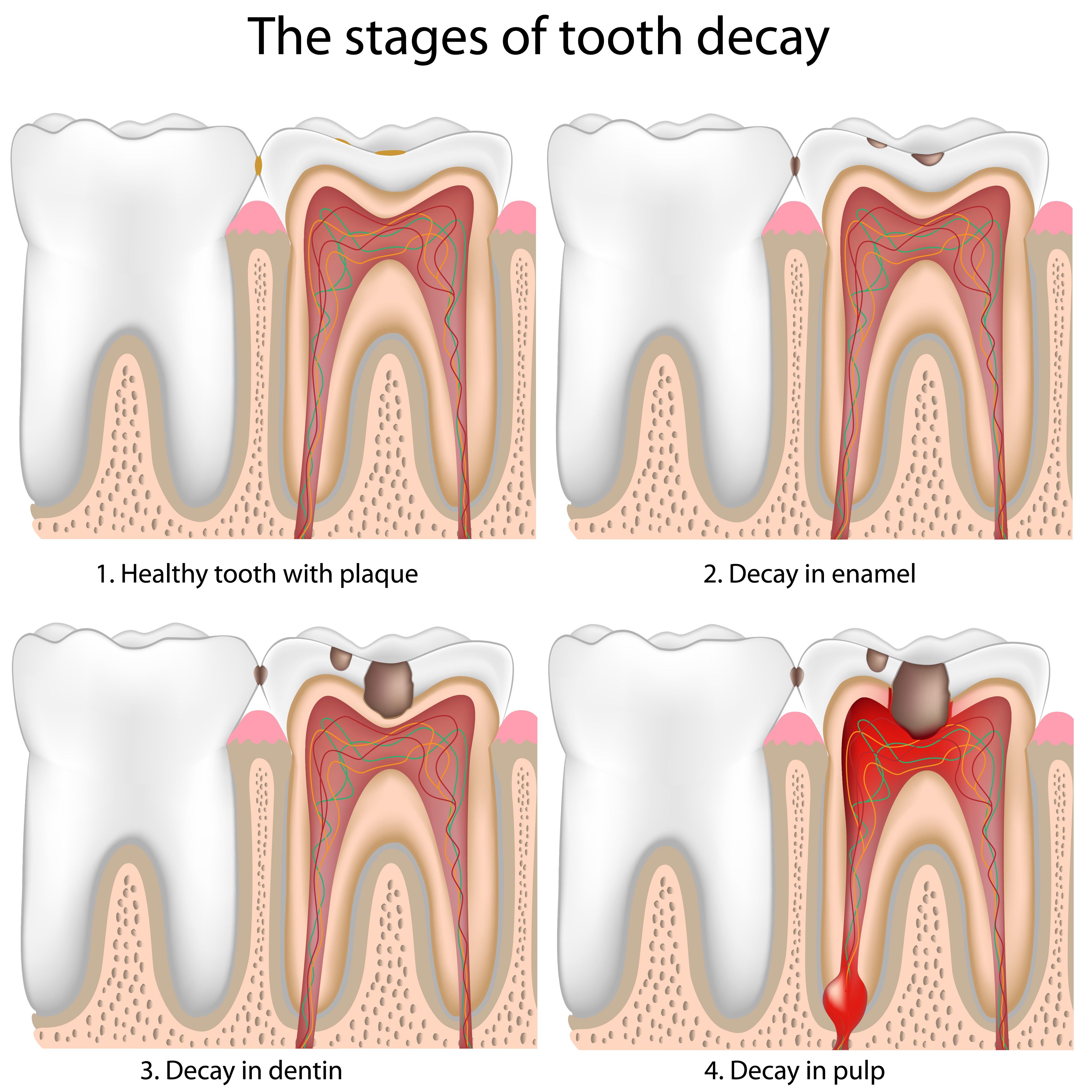The Stages of Tooth Decay: Progression of a Cavity
 Tooth decay has different stages, and it's important that it be addressed as soon as possible. That's why the team at our Wichita restorative dentistry center always takes great care when it comes to the treatment and prevention of cavities.
Tooth decay has different stages, and it's important that it be addressed as soon as possible. That's why the team at our Wichita restorative dentistry center always takes great care when it comes to the treatment and prevention of cavities.
We'd like to consider the five different stages of tooth decay below. Knowing what tooth decay can do to your teeth, this should help you understand the importance of preventative care.
Stage One: The Initial Lesion
The first stage of tooth decay involves the formation of a lesion on the tooth. This typically manifests itself as a bit of discoloration on the surface of the tooth, typically white or brown in color. This initial lesion will not show up on dental x-rays as decay, but it is a sign that demineralization has begun.
Thankfully tooth decay at this early stage can be prevented and even reversed. Dentists may recommend fluoride treatments, better oral hygiene practices from patients, the use of dental sealants, and other general dentistry treatments.
Stage Two: Enamel Decay
In the second stage of tooth decay, demineralization progresses and the tooth enamel (the topmost layer of the tooth's structure) starts to breakdown. This leads to the tooth decay showing up on dental x-rays, and can result in mild tooth sensitivity since the lower layers of tooth structure are less protected.
When tooth decay reaches this stage, the ideal option for treatment is the use of dental restorations. In most cases, a dental filling will suffice for minor cavities. More serious tooth decay may require an inlay or an onlay, both of which can rebuild more of the tooth's structure.
Stage Three: Dentin Decay
As the tooth decay progresses, the dentin layer of the tooth may become affected. Dentin is a porous substance located beneath the tooth enamel. The pores in the dentin are known as dentinal tubules. The presence of these pores means that tooth decay can spread faster, tooth sensitivity becomes far more uncomfortable, and the tooth decay can lead to far more serious health issues in later stages.
Dentin decay is most often treated with inlays, onlays, or dental crowns. These dental restorations are used to protect the inner layers of the tooth structure from further damage, and they can restore a person's ability to bite and chew without severe discomfort.
Stage Four: Dental Pulp Infection
Inside of every tooth is a substance known as dental pulp. This pulp is comprised of blood vessels, nerve endings, and connective tissue that were essential for the initial formation and maturation of the tooth. When bacteria and tooth decay reaches this dental pulp, a painful root canal infection can occur.
When the dental pulp becomes infected, the best option for treatment is root canal therapy. A root canal involves the removal of the diseased dental pulp, the sterilization of the pulp chamber, the filling of the chamber, and the capping of the tooth with a dental crown.
Stage Five: Formation of an Abscess
When the infected tooth and pulp chamber are not treated, an abscess may form. An abscess is a formation of pus that collects in the soft tissues as the body fight off bacterial infection. The infection from the tooth may spread further without treatment, leading to major wellness issues.
If an oral abscess forms, it's important that it be carefully drained by a medical or dental professional. Antibiotics are often prescribed to help with treatment. Dentists will also need to consider various restorative options to address the damage done to adjacent structures in the mouth.
Learn More about Tooth Decay
If you would like more information about cavities, how they can be prevented, and your options for treatment, we encourage you to contact our cosmetic and restorative dentistry center today. Our team will help you develop good oral hygiene practices and help you smile with renewed confidence.



